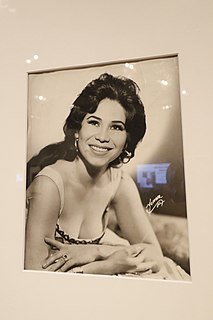Related Research Articles

María Elena Velasco Fragoso was a Mexican actress, comedian, singer-songwriter and dancer. She is best known for creating and portraying La India María, a comical character based on indigenous Mexican women.

El ministro y yo is a 1976 Mexican film directed by Miguel M. Delgado and starring Cantinflas, Chela Castro, Lucía Méndez and Ángel Garasa. It is the last film in which Cantinflas acted alongside Garasa.

Su Excelencia is a 1967 Mexican political satire film directed by Miguel M. Delgado and starring Cantinflas and Sonia Infante. The film is set in a parody universe where "Red" and "Green" countries are the political equivalents of the socialist and capitalist countries of the Cold War, which the film satirizes. Cantinflas portrays Lupitos, a chancellor stationed in his country's embassy in the communist country of Pepeslavia who later ascends to the role of ambassador and has to decide the pivotal vote of joining the "Reds" or the "Greens", therefore deciding the fate of the entire world.
The Illiterate One is a 1961 Mexican comedy film, directed by Miguel M. Delgado, starring Cantinflas, Lilia Prado, and Sara García. It is the second Cantinflas film presented by Columbia Pictures.
José María Prada Oterino was a Spanish film and television actor. He appeared in more than 80 films and television shows between 1954 and 1978.

Hasta que el dinero nos separe is a Mexican telenovela premiered on Canal de las Estrellas on June 29, 2009, and concluded on May 16, 2010. The series is created and produced for Televisa by Emilio Larrosa, based on the Colombian telenovela Hasta que la plata nos separe written by Fernando Gaitán. It stars Pedro Fernández and Itatí Cantoral as the titular characters.

Entre el Amor y el Odio is a Mexican telenovela produced by Salvador Mejía Alejandre for Televisa in 2002. It is based on the radionovela Cadena de odio by Hilda Morales de Allouis. It aired on Canal de las Estrellas from February 11, 2002 to August 2, 2002.
I Am a Fugitive is a 1946 Mexican comedy film directed by Miguel M. Delgado and starring Cantinflas, Emilia Guiú and Daniel "Chino" Herrera. The film's sets were designed by Manuel Fontanals.
The Magician is a 1949 Mexican comedy film directed by Miguel M. Delgado and starring Cantinflas, Leonora Amar and José Baviera. The film tells the story of lookalike hired from an agency to take the place of a magician who has gone on holiday.
Gran Hotel is a 1944 Mexican film directed by Miguel M. Delgado, starring Cantinflas.
The Doorman, also known as Puerta, joven, is a 1950 Mexican comedy film directed by Miguel M. Delgado and starring Cantinflas and Silvia Pinal.
A Tailored Gentleman is a 1954 Mexican comedy film, directed by Miguel M. Delgado and starring Cantinflas, Martha Valdés and Ángel Garasa. The film's art direction was by Gunther Gerszo.
Drop the Curtain is a 1955 Mexican comedy film directed by Miguel M. Delgado and starring Cantinflas, Christiane Martel and Beatriz Saavedra. The film's art direction was by Gunther Gerszo.
The Sin of Being a Woman is a 1955 Mexican drama film directed by Zacarías Gómez Urquiza and starring Tito Guízar and Alma Rosa Aguirre. The film's sets were designed by art director Javier Torres Torija.
Con el cuerpo prestado is a 1983 Mexican fantasy comedy film directed by Tulio Demicheli and starring Sasha Montenegro and María Sorté.
La Coyota is a 1987 Mexican action drama film directed by Luis Quintanilla Rico and starring Beatriz Adriana, Juan Valentín, Jorge Vargas and Miguel Ángel Rodríguez.
Another Spring is a 1950 Mexican drama film directed by Alfredo B. Crevenna and starring Libertad Lamarque and Ernesto Alonso.
Such Is My Country is a 1937 Mexican comedy film directed by Arcady Boytler and starring Antonio R. Frausto, Mercedes Soler, Juan José Martínez Casado, Manuel Medel, and Cantinflas. It was the first film to feature Cantinflas in a prominent role and the first of Cantinflas's films together with Medel as a team.
El sátiro is a 1980 Mexican comedy film directed by Raúl Zenteno and starring Mauricio Garcés, Patricia Rivera, and Alberto Rojas.
Dos hijos desobedientes is a 1960 Mexican Western musical comedy film directed by Jaime Salvador and starring Pedro Armendáriz, Antonio Aguilar, Elvira Quintana and María Duval.